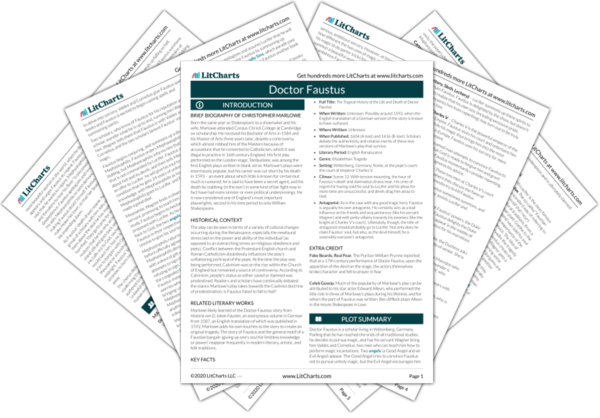Faustus' bargain with Lucifer is the most famous part of Doctor Faustus. The so-called “Faustian bargain” has become a standard way of referring to some kind of “deal with the devil,” a motif that recurs throughout Western literary and cultural traditions (from a version of the Faust story by the German poet Goethe to the blues musician Robert Johnson, who legend says sold his soul to Satan for his skill on the guitar). But the importance of the bargain extends beyond this famous plot device. The idea of some kind of economic exchange or deal pervades the tragedy. Just as Lucifer cheats Faustus in their deal, Faustus cheats the horse-courser who buys a horse from him and Wagner gets a clown to agree to be his servant in return for learning some magic. These deals might be taken to suggest that bargains are often simply occasions for one individual to exploit another.
However, there is another system of bargaining in the play, related to Christianity. The very word “redemption” literally means “a buying back.” In Christian thinking, Jesus redeems mankind by “buying back” their sins at the expense of his own death. If Faustus' bargain with Lucifer is sealed with blood, God's agreement with mankind is, too—with the very blood of Jesus, shed on the cross. Moreover, Faustus can strike a deal with God at any point in the play, gaining eternal salvation by simply repenting his sins. Lucifer may hold Faustus to his original agreement, threatening him when he thinks about repenting, but God is willing to take mercy even on sinners who don't uphold their end of the divine bargain. Faustus, however, refuses to make this ultimate deal. At the end of the play, he is desperate but still attempts to haggle with God, begging for salvation in return for a thousand or a hundred-thousand years in hell.
Thus, one could see the play as ultimately about good and bad deals. And through this profusion of deals and exchanges, Marlowe is able to raise questions of value: what is worth more, power in this world or salvation in the next? How much is a soul worth? Can it even be put in terms of money and profit? As a tragic hero, Faustus is done in by his excessive ambition and pride, but he is also doomed by his tendency to under-value the things he bargains with and over-value the things he bargains for.
The Bargain ThemeTracker

The Bargain Quotes in Doctor Faustus
Go bear these tidings to great Lucifer,
Seeing Faustus hath incurred eternal death
By desperate thoughts against Jove's deity:
Say, he surrenders up to him his soul
So he will spare him four and twenty years,
Letting him live in all voluptuousness,
Having thee ever to attend on me,
To give me whatsoever I ask,
To tell me whatsoever I demand,
To slay mine enemies, and aid my friends,
And always be obedient to my will. (87-89)
Had I as many souls as there be stars,
I'd give them all for Mephastophilis.
By him I'll be great emperor of the world. (102-104)
But Faustus, thou must bequeath it solemnly,
And write a deed of gift with thine own blood,
For that security craves great Lucifer. (34-36)
Sweet Mephastophilis, entreat thy lord
To pardon my unjust presumption;
And with my blood again I will confirm
My former vow I made to Lucifer. (60-63)
One thing, good servant, let me crave of thee,
To glut the longing of my heart's desire:
That I might have unto my paramour
That heavenly Helen which I saw of late,
Whose sweet embracings may extinguish clean
These thoughts that do dissuade me from my vow:
And keep mine oath I made to Lucifer. (72-78)
















